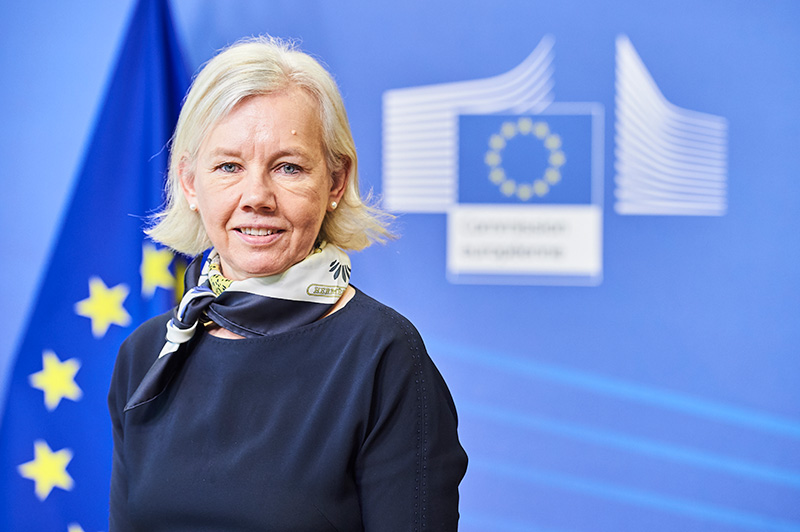Interview

Related topics
Bankingdate: 31/10/2023
Alexandra Jour-Schroeder is Deputy Director General of the European Commission´s Directorate-General for Financial Stability, Financial Services and Capital Markets Union (DG FISMA). She talks about what the EU is doing to tackle money laundering and terrorist financing, where negotiations stand on the future EU Anti-Money Laundering Authority, and the role of the national Financial Intelligence Units.
What kind of tools does the EU’s Anti-Money Laundering (AML) regime provide to address the problems of money laundering and the financing of terrorism?
Since the adoption of the first anti-money laundering directive in 1991, the EU has developed a solid regulatory framework for preventing and combatting money laundering and terrorist financing. These rules have evolved to meet an ever-changing risk environment, while still ensuring full respect for fundamental rights. However, the current legislative framework is based on a directive that requires transposition into national law, creating divergence between national rules and resulting in fragmented approaches across the EU. To address these issues, the Commission published a package of AML legislative proposals in 2021, based on more harmonisation and a risk-based approach. This will create a single EU rulebook, with more detailed rules for the private sector that will become directly applicable through a regulation, and a proposal for a sixth AML Directive containing requirements on supervision and Financial Intelligence Units to be applied by Member States. Moreover, the package creates a new Anti-Money Laundering Authority (AMLA), which will combine supervisory activities and support to national Financial Intelligence Units (FIU). It also addresses the risks deriving from transfers of crypto assets, by extending the scope of the rules on information accompanying the transfers of funds to transfers of crypto assets.
How has the European Commission taken the role of technology into account when putting together the AML package?
New technologies can improve the speed, quality, and efficiency of measures to combat money laundering and terrorist financing, while also reducing their costs. New technological developments in ‘regtech’ (regulatory technology used by industry) and ‘suptech’ (supervisory technology used by AML supervisors) have a key role to play in ensuring a more effective fight against financial crime.
The Commission has adopted a holistic approach to the role of technology in the AML legislative package, remaining technologically neutral in order not to hamper competition, which is a driver of progress in this field. For this reason, the package is silent on the use of specific technological solutions for AML purposes. Instead, it aims to empower both competent authorities and ‘obliged entities’ (entities or individuals that are legally required to implement measures to prevent money laundering and terrorist financing) to make use of new technologies in the fight against money laundering and terrorist financing.
Where do negotiations stand on the future Anti-Money Laundering Authority (AMLA)? What will its role be?
The European Parliament and the Council have adopted their mandates for the Anti-Money Laundering Authority Regulation, and negotiations are currently progressing well, with the aim of reaching a political agreement before the end of Parliament’s mandate. Negotiations are also taking place to determine the seat of AMLA, and a number of Member States have expressed an interest in hosting the new authority – we launched on 28 September the call for applications by Member States.
AMLA will establish an integrated system of supervision across the EU, based on common methods and convergence of high standards. It will directly supervise some of the riskiest financial institutions operating on a cross-border level, while also supporting cooperation among national FIUs and coordinating supervisors in the non-financial sector.
Can you tell us a bit about the role of FIUs?
The role of the FIU is to prevent, detect and combat money laundering and terrorist financing. The AML package provides FIUs with enhanced powers, which include suspension powers relating to transactions or the use of bank or payment accounts where there is a suspicion that money laundering or terrorist financing may be involved.
AMLA will also play an important role in supporting FIUs. It will facilitate cooperation between them, including by supporting and taking part in joint analyses, and by hosting the central online system, FIU.net, a platform for secure information exchange between the EU’s FIUs.
In a nutshell, what would you say is the most important message when it comes to AML and the work that the Commission is doing?
Money laundering and terrorist financing represent an ongoing challenge to the integrity of the EU’s financial system and the security of its citizens. In its most recent Serious and Organised Crime Threat Assessment, Europol noted the large-scale existence of professional money laundering enablers using sophisticated and innovative schemes to launder the proceeds of crime. The EU’s AML legislative framework needs to meet the challenge of an ever-evolving criminal landscape. The robust safeguards in the AML package and the game-changing role of AMLA provide the EU with a comprehensive and integrated system that is commensurate to the integration of its internal market. It also constitutes a solid basis to address current and future challenges posed by evolving criminal methods. The early agreement on the recast EU Transfer of Funds Regulation (June 2023) is also testimony both to the awareness and determination of EU regulators to promptly address new realities in the fight against Money Laundering and the Financing of Terrorism.
